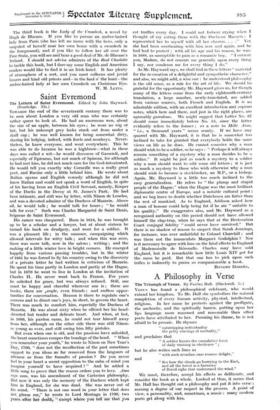A Philosophy in Verse
The Triumph of Venus. By Fairfax Hall. (Blackwell. Is.) VENUS has found a philosophical celebrant, who would extend her kingdom. To Mr. Hall she symbolizes the natural completion of every human activity, physical, intellectual, religious. In her name he protests against the profligate, the anchorite, and the spiritually barren, putting upon her lips language more reasoned and reasonable than other poets have attributed to her. l'ursuing his theme, he is not afraid to be prosaic. He rhymes
" outstripping individuality the petty cravings of mortality," and proclaims that " A soldier knows the cumulative force of daily training in obedience " ;
but he also writes such lines as
" with such arcadian ease resume delight," " See how the clouds go hurrying to tho East, and all the forest is a harmony of fluted sighs that understand the wind."
We must, therefore, accept his effects as deliberate, and consider the book as a whole. Looked at thus, it seems that Mr. Hall has thought out a philosophy and put it into verse : earning a degree of our respect in the process. A point of view, a personality, and, sometimes, a music : many modern poets get along with less.
and


























































 Previous page
Previous page